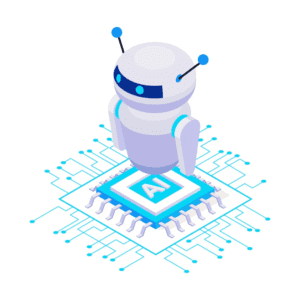Summary: Embark on your journey to learn AI from scratch with a structured roadmap. Start by mastering foundational concepts in mathematics and programming. Select the right learning path tailored to your goals and preferences. Engage in practical projects, seek mentorship, and join AI communities for support and guidance. Continuous learning is critical to becoming an AI expert, so stay updated with online courses, research papers, and workshops. Specialise in domains like machine learning or natural language processing to deepen expertise. With dedication and perseverance, anyone can master AI and unlock its boundless potential.
Table of Contents
ToggleYour Roadmap to Learn AI from Scratch 2024
AI is rapidly evolving and has remained in the headlines for several years. From enhancing healthcare diagnostics to revolutionising transportation, AI’s influence permeates every facet of modern life. The urgency to grasp AI’s intricacies is undeniable.
Learning AI from scratch is more than staying relevant and shaping the future. As industries pivot towards AI-driven solutions, the need for individuals equipped with AI expertise intensifies. This blog delves into the essence of learning AI from scratch, unravelling its significance in today’s dynamic landscape of innovation and opportunity.
Keep reading, as I will also tell you how to learn AI and the roadmap. Ultimately, you will also learn how to become an AI expert and how professional certification courses can help you gain AI skills.
Key Takeaways
- AI encompasses machine learning, neural networks, NLP, and robotics.
- Vital in healthcare, finance, and transportation, AI offers diverse career opportunities.
- Learning AI requires grasping mathematics, statistics, and programming fundamentals.
- Engage in hands-on projects and join AI communities for practical experience.
- Progress from beginner to expert through continuous learning and domain specialization.
Understanding Artificial Intelligence
Definition of Artificial Intelligence (AI)
Artificial Intelligence, often called AI, refers to developing computer systems capable of performing tasks that typically require human intelligence. These tasks include learning, reasoning, problem-solving, perception, and language understanding.
Fundamental Concepts of AI
- Machine Learning: This branch of AI enables machines to learn from data and improve their performance over time without being explicitly programmed.
- Neural Networks: Inspired by the human brain’s structure, neural networks are algorithms that allow machines to recognise patterns and make decisions based on input data.
- Natural Language Processing (NLP): NLP enables computers to understand, interpret, and generate human language, facilitating communication between humans and machines.
- Robotics: AI-driven robotics involves designing robots capable of autonomously performing tasks in the physical world, ranging from simple assembly line operations to complex surgeries.
How AI Simulates Human Intelligence
- AI achieves human-like intelligence through algorithms and models that mimic cognitive processes such as learning, reasoning, and problem-solving.
- By processing vast amounts of data and identifying patterns, AI systems can make predictions, draw insights, and adapt their behaviour in response to changing environments.
- Through techniques like deep learning and reinforcement learning, AI systems simulate the ability to learn from experience and improve their performance over time, similar to how humans learn from trial and error.
Why Learn AI?
Significance in Various Industries
- Healthcare: AI assists in diagnosing diseases, analysing medical images, and predicting patient outcomes, leading to more accurate diagnoses and personalised treatment plans.
- Finance: AI algorithms are used for fraud detection, risk assessment, and portfolio management, enhancing the efficiency and security of financial transactions.
- Transportation: AI technologies power autonomous vehicles, traffic management systems, and predictive maintenance, improving safety and efficiency in transportation networks.
Career Opportunities and Innovation
- Career Growth: With the AI market projected to grow rapidly, there are abundant job opportunities across industries, ranging from data scientists and machine learning engineers to AI ethicists and robotics specialists.
- Innovation: AI fuels innovation by enabling breakthroughs in natural language processing, computer vision, and reinforcement learning, driving advancements in technology and society.
Market Projections
- According to NDTV, India’s AI market is expected to grow at an annualised rate of 25-35% between 2024 and 2027.
- Forbes projects the global AI market size to expand at a CAGR of 37.3% from 2023 to 2030, indicating substantial growth and opportunities in the AI industry.
How to Learn AI?
- Online Courses and Tutorials
- Dive into the vast ocean of AI knowledge through online courses and tutorials from reputable platforms.
- Explore introductory to advanced courses covering machine learning, deep learning, natural language processing, and computer vision.
- Benefit from video lectures, interactive quizzes, and hands-on projects to reinforce your understanding of AI concepts.
- Books and Academic Resources
- Delve into the depths of AI theory and practice by exploring books written by experts in the field, such as “Artificial Intelligence: A Modern Approach” by Stuart Russell and Peter Norvig.
- Use academic journals, research papers, and online resources from renowned institutions like MIT and Stanford to stay updated on the latest advancements in AI.
- Hands-on Projects and Practical Experience
- Apply theoretical knowledge to real-world problems through hands-on projects and practical exercises.
- Utilise platforms like Kaggle to participate in data science competitions and collaborate with fellow AI enthusiasts.
- Seek internships or freelance opportunities to gain practical experience and build a strong portfolio.
- Selecting the Right Learning Path
- Reflect on your goals and interests to choose a learning path that aligns with your aspirations.
- Consider preferred learning style, time commitment, and available resources when selecting courses or projects.
- Stay flexible and open-minded. The field of AI is constantly evolving, and new opportunities for learning and growth may emerge along the way.
Roadmap to Learn AI
- Setting Clear Learning Objectives
- Identify your goals: Before diving into the vast realm of Artificial Intelligence (AI), you must clearly understand what you aim to achieve. Whether mastering specific AI techniques or pursuing a career in AI research, defining your objectives will guide your learning journey.
- Break down objectives: Once you’ve set overarching goals, break them into smaller, manageable ones. This approach helps maintain focus and enables you to track your progress effectively.
- Understanding Foundational Concepts
- Mathematics: Mathematics forms the backbone of AI. Brush on foundational concepts such as algebra, calculus, probability, and linear algebra. These mathematical principles underpin many AI algorithms and models.
- Statistics: Statistical methods are vital in AI, particularly in data analysis and machine learning. Gain proficiency in probability theory, hypothesis testing, regression analysis, and statistical inference.
- Programming: Proficiency in programming languages like Python, R, or Julia is essential for implementing AI algorithms. Start with the basics of programming, then progress to more advanced topics such as data structures, algorithms, and object-oriented programming.
- Learning Essential AI Algorithms and Techniques
- Machine Learning: Dive into machine learning, a subset of AI focused on developing algorithms that enable computers to learn from data. Learn about supervised, unsupervised, reinforcement, and deep learning techniques.
- Neural Networks: Delve deeper into neural networks, a powerful AI model inspired by the human brain. Understand how neural networks function, including their architecture, activation functions, and training methods.
- Engaging in Practical Projects and Real-world Applications
- Hands-on Projects: Apply theoretical knowledge to practical projects. Work on datasets, build predictive models and solve real-world problems using AI techniques.
- Kaggle Competitions: Participate in Kaggle competitions to test your skills, learn from others, and gain exposure to diverse AI challenges.
- Seeking Mentorship and Joining AI Communities
- Mentorship: Find mentors or experienced professionals in the field who can provide guidance, advice, and feedback on your AI journey.
- AI Communities: Join online forums, discussion groups, and AI communities to connect with like-minded individuals, share insights, and stay updated on the latest developments in AI.
Embarking to master AI requires dedication, perseverance, and a willingness to learn. By following this roadmap and remaining committed to continuous improvement, you can navigate the complexities of AI and unlock its boundless potential.
How to Become an AI Expert?
- Embarking on the Journey
- Initiating the journey from a beginner to an expert in AI requires dedication and perseverance.
- Understanding that expertise in AI is not achieved overnight but through consistent effort and learning.
- Continuous Learning Strategies
- Keeping pace with the rapidly evolving field of AI demands a commitment to continuous learning.
- Stay updated by leveraging various resources such as online courses, research papers, and workshops.
- Engaging in practical projects and challenges to apply theoretical knowledge and enhance skills.
- Specialisation and Domain Focus
- Recognising the importance of specialisation within AI to deepen expertise and career prospects.
- Exploring different domains within AI, such as machine learning, natural language processing, or computer vision.
- Focusing efforts on mastering specific techniques and tools relevant to chosen domains.
Closing Statements
Learning AI from scratch necessitates understanding the fundamental concepts and following a well-structured roadmap. By exploring how to learn AI through foundational mathematics, programming skills, and hands-on projects, individuals can progress towards becoming AI experts.
Leveraging mentorship, community support, and a commitment to continuous learning are pivotal in mastering AI. Thus, one can navigate the field’s complexities, unlock its potential, and contribute to its ever-evolving landscape by adhering to a clear roadmap to learning AI.
Ready to launch your career into the thriving world of AI and Data Science? Join Pickl.AI today and unlock your potential! As AI reshapes industries, the demand for Data Science skills is skyrocketing.
Pickl.AI offers top-tier online professional certification courses guided by practising data scientists and real-world projects, whether you’re a seasoned professional or just starting.
Discover our flagship programs, like the Job Guarantee and Job Preparation Program, designed to propel your career forward. Dive into our Data Science Bootcamp for comprehensive training. Free ChatGPT and Machine Learning courses cater to everyone.
Don’t miss this opportunity to master relevant data science tools and skills. Start your journey with Pickl.AI today and carve your path to success!
FAQs
To learn AI from scratch, it’s vital to grasp foundational concepts in mathematics such as algebra, calculus, and probability. Proficiency in programming languages like Python is crucial for implementation. These skills lay the groundwork for understanding and effectively applying AI algorithms.
Selecting the proper AI roadmap involves considering your goals, learning style, and available resources. Evaluate courses and resources that align with your objectives, focusing on machine learning, deep learning, and natural language processing to build a solid foundation.
For mentorship and community support in learning AI, seek guidance from experienced professionals and join online forums and communities dedicated to AI enthusiasts. Engaging with mentors and fellow learners provides valuable insights, feedback, and encouragement throughout your journey to becoming an AI expert.















